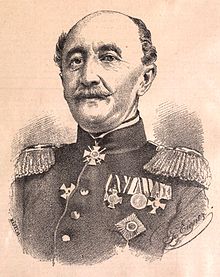Benno Hann von Weyhern (General, 1808)
Otto Rudolf Benno Hann von Weyhern (born October 23, 1808 in Lübben , † November 2, 1890 in Frankfurt (Oder) ) was a Prussian general of the cavalry .
Life
origin
Benno Hann of Weyhern comes from the 1752 ennobled noble family of Hann which after its Upper Palatinate family estate Weyhern also "Hann of Weyhern" calls. His parents were the Electorate of Saxony Major General Joseph Hann of Weyhern (1765-1840) and Christiane Caroline Elisabeth Hermann, divorced Wihert.
Military career
Hann von Weyhern began his military career in 1821 at the Saxon Cadet Institute in Dresden . In 1824 he changed to Prussian services and was employed in the 3rd Hussar Regiment . There he advanced to Rittmeister and squadron chief until 1844 .
In 1848 Hann von Weyhern took part in the battles at Düppel, Fridericia and Woyens during the First Schleswig-Holstein War . But in the same year he took his leave with a pension and the right to wear his regimental uniform. He received in 1849 the character as a Major and permission in Schleswig - Holstein to get services. In the same year Hann von Weyhern became lieutenant colonel and commander of the 1st Dragoon Regiment in the Schleswig-Holstein army . So he was again in the field against Denmark and took part in battles at Kolding and Fridericia. In 1850 he quit Schleswig-Holstein.
In 1852 Hann von Weyhern returned to Prussian service and was employed with a patent as a major à la suite in the 2nd Dragoon Regiment . In 1853 he was employed as director of the Schwedt military riding school . In 1856 Hann von Weyhern became the commander of the 5th Hussar Regiment and in the same year was promoted to lieutenant colonel and in 1859 to colonel . Also in 1859 he was employed à la suite as commander of the 10th Cavalry Brigade and in the same year was commissioned to lead the 7th Cavalry Brigade . In 1863 he was promoted to major general .
During the mobilization for the German war , Hann von Weyhern was commander of the 2nd Cavalry Division of the 1st Army. He took part in the battles at Turnau, Münchengrätz and Blumenau as well as in the battle at Königgrätz . On September 17, 1866, Hann von Weyhern was promoted to commander of the 4th Division and three days later, with the award of the sword to the Order of the Crown, 2nd class with a star, to Lieutenant General.
In the war against France, Hann von Weyhern fought in the battles of Gravelotte and Chambigny, in the sieges of Metz and Paris and in the battle near Dijon . Awarded both classes of the Iron Cross , he was promoted to Commanding General of the II Army Corps in 1871 and to General of the Cavalry. As head of the Hussar Regiment No. 5, which he was from 1872, Hann von Weyhern received the Grand Cross of the Red Eagle Order with Oak Leaves and Swords in early September 1873 . In the following year he accompanied the Crown Prince to St. Petersburg , where the Tsar awarded him the Alexander Nevsky Order . Kaiser Wilhelm I paid tribute to Hann von Weyhern in mid-September 1879 by being awarded the Order of the Black Eagle . Leaving his position as regimental commander Hann was of Weyhern on June 14, 181 with pension to the disposition made and he with the Großkomturkreuz with Star of the Royal House Order of Hohenzollern excellent.
family
Hann von Weyhern married Bertha Elisabeth Dorothea von Boltenstern (1811–1881) in Halle (Saale) on February 2, 1832 . Daughter of the Prussian major Magnus Ferdinand Wilhelm Franz von Boltenstern (1786–1814). The marriage had two children.
- Benno Ferdinand Richard (1833–1912), Prussian Lieutenant General ⚭ 1857 Julie Charlotte Friederike Adelaide von Kahle (* 1840)
- Hedwig Beate Mathilde Karoline (* 1850) ⚭ 1872 Robert Henning von Heyden († before 1821), Lord of Obernitz , ducal Saxon-Meiningischer chamberlain , Prussian captain a. D. and legal knight of the Order of St. John
Works
- Views on how to train a squadron for the needs of today. Berlin 1876.
literature
- Bernhard von Poten : Hann von Weyhern, Benno . In: Allgemeine Deutsche Biographie (ADB). Volume 49, Duncker & Humblot, Leipzig 1904, p. 759 f.
- Kurt von Priesdorff : Soldier leadership . Volume 7, Hanseatische Verlagsanstalt Hamburg, undated [Hamburg], undated [1939], DNB 367632829 , pp. 326-329, no. 2319.
Web links
- Benno Hann von Weyhern. In German biography.
- Literature by and about Benno Hann von Weyhern in the catalog of the German National Library
Individual evidence
- ^ Ernst Heinrich Kneschke : New general German nobility lexicon . Volume 4, Leipzig 1863, p. 188.
- ↑ a b Gothaisches genealogical pocket book of the letter aristocratic houses . Twelfth year, Justus Perthes Gotha 1918, pp. 317–318.
| personal data | |
|---|---|
| SURNAME | Hann von Weyhern, Benno |
| ALTERNATIVE NAMES | Hann von Weyhern, Otto Rudolf Benno (full name) |
| BRIEF DESCRIPTION | Prussian general of the cavalry |
| DATE OF BIRTH | October 23, 1808 |
| PLACE OF BIRTH | Luebben |
| DATE OF DEATH | November 2, 1890 |
| Place of death | Frankfurt (Oder) |

